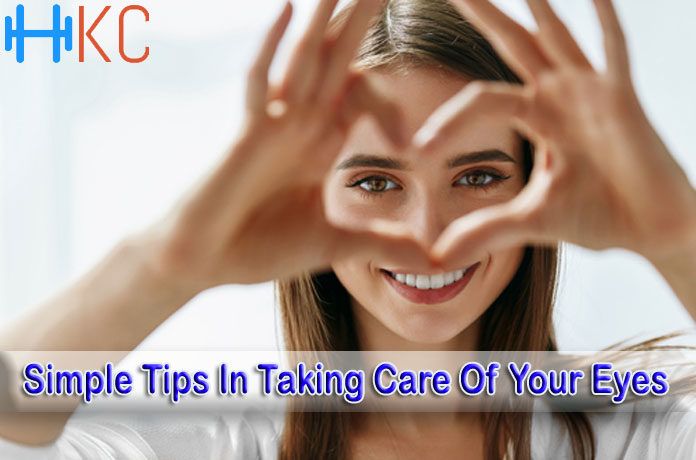The eyes, though very important, are often taken for granted. Our eyes are what makes us function well as an individual. If we take care of our oral health, our eyes deserve a lot of extra attention too.
Take these simple tips into consideration in taking care of your eyes. Let’s take a look.
See an eye doctor even if you don’t feel it’s necessary –
We often go to doctors only when we don’t feel right. That shouldn’t be the case, especially with our eyes. Don’t wait until you really need to go to the doctor. Keep in mind that prevention is better than cure. An adult aged 18 to 60 years old needs to have their eyes checked at least every two years even when there’s no symptoms of having any vision problems. People with high-risk conditions should visit an eye doctor every year or as recommended.
That’s according to the American Optometric Association. And, according to them, these are the people with a high-risk condition:
- A person with systemic health conditions with potential ocular manifestations.
- A person with a family history of ocular diseases.
- A person who belongs to specific ethnic and racial groups.
- A person with an occupation that’s visually demanding or hazardous.
- A person with prescription or nonprescription drugs that can have visual side effects.
- A person having only one functional eye.
- A person wearing contact lenses.
- A person who had eye surgery or injury.
- High or progressive refractive error.
- Other eye-related conditions.
Wear sunglasses –
Even during winter, when the sun’s not very bright, one should still wear sunglasses to protect the eyes. The sun’s harmful ultraviolet radiation may cause eye problems like pinguecula, pterygia or keratitis. Sunglasses should completely block both UVA and UVB of the sun’s rays. They should be able to screen out most of the visible light, and the shade is perfectly matched on both lenses.
Eat a well-balanced diet –
There’s certain nutrients that should be in your diet to keep your eyes healthy. They are:
- Lutein and Zeaxanthin – Lutein and Zeaxanthin are found in foods like eggs, spinach, and kale, which can reduce the chance of getting chronic eye diseases.
- Vitamin C – We have a perception that only the orange fruits and vegetables are good for the eyes, that’s not entirely true, even vitamin C, which is in many fruits and vegetables will help your eyes stay in their best condition.
- Vitamin E – This is present in vegetable oils, nuts, and seeds, and can protect the cells in your eyes from tissue breakdown. It’s also found in green vegetables like spinach and broccoli.
- Omega 3 – The retina benefits from Omega-3 fatty acids found in fish, flax seeds, walnuts, and chia seeds can help send messages to your brain from your eyes.
- Zinc – Zinc is found in some seafood, red meat, beans and poultry to help the protective pigment in the eyes. It can also help your body produce melanin.
Hypertension and type 2 diabetes are conditions that affect the eyes and eating a well-balanced diet will help to reduce the risk of getting these illnesses.
Daily warm compress on eyelids –
Meibomian glands are found in the eyelids, and they’re responsible for pumping oil as a healthy wet film onto the surface of your eyes, and they’re not very productive as you get older. Dry eye or blepharitis can develop if these glands aren’t pumping enough oil to your eyes. We can help the meibomian glands work as they should by applying a warm compress on the eyelids to soften up the oil that may be clogged due to age. Warm compress is done by wetting a washcloth with warm water and pressing it on your closed eyes for a few minutes.
Have a break from computer screens –
Being in front of a computer or looking at a phone screen for too long can cause your eyes to be strained. You may have blurry vision and trouble focusing at a distance. If your work requires too much time on a computer, you may protect your eyes by:
-
- Wearing protective eyeglasses. If you have prescription glasses, make sure they have an anti-reflective or anti-glare coating that eliminates the reflection of light from your computer. If you don’t have a pair of computer glasses yet, visit an eye center to get one. Kudo Care Center utilizes the latest technology in their Optometry department and has a comprehensive visual evaluation for perfect glasses and contact lenses.
- Positioning your monitor to where you’re slightly looking down at it. Your eyes should be at the level of the top edge of the monitor.
- Look far away after 20 minutes or so. Try looking out the window and don’t focus on anything, just look as far as you can. This should relax the muscles of your eyes to reduce eye fatigue.
- Use an anti-glare computer screen and avoid glare from windows and lights.
- Sit on a comfortable chair where your feet should be flat on the floor.
- Blink more to prevent dry eyes.
The eyes need as much rest as they can, just like our body. If you can, close your eyes for a few minutes to relieve the tension. Taking care of your eyes now will benefit you as you grow older. Vision is one thing that nobody would ever want to lose. Take these tips to make sure you have healthy vision for a very long time.























